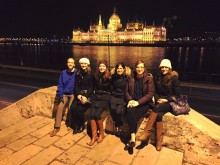In December 2015, eight CERES MA students joined CERES Program Advisor Dr. Edith Klein and Prof. Robert Austin for a week of field research as part of Prof. Austin’s course on twentieth- and twenty-first-century Hungary. Students met with a variety of NGO leaders, academics, politicians, and activists. The trip was made possible by the generous support of Tom and Irene Mihalik and CERES’s Hungarian Studies Program. CERESA MA students Avi Lipsitz and Lucia Gonzalez were among the group that made the trip.
Avi’s goal for his field research was to investigate how the country’s religious communities responded to the migrant/refugee crisis that swept through Europe this past summer. In particular, he wanted to investigate if and how religious groups reconciled their presumed religious duty to do charitable work with the negative sentiment towards the migrants/refugees that prevailed in broader Hungarian society.
Avi also used this opportunity to explore the broader relationship between religious communities and the Hungarian government – a relationship that has seen a number of changes in recent years and which continues to evolve. Thanks to his participation in this trip, Avi was able to gain important fieldwork experience in addition to the valuable data he gathered from his meetings with academics, religious groups, political figures, and NGOs.
For her project, Lucia Gonzalez focused on the integration of Roma children in pre-school systems around Hungary, specifically in Budapest. Her objective was to investigate the ways in which the newly implemented policies on education from FIDESZ have influenced the experience of Roma children and their (de-)segregation in pre-schools. She had the opportunity to interview stakeholders from varied sectors including Ilona Móricz, Director of the Centre for Independent Journalism in Budapest; Nevsija Durmish, Junior Program Officer at the Roma Education Fund; Marek Szilvasi, Research and Advocacy Officer at the European Roma Rights Centre; and Anna Daróczi, MA graduate from Central European University and Roma activist.
Lucia says that she loved the field part of the course because it was a great opportunity to learn more about field research: “I had the opportunity to interview people with different minds and perspectives, from educators to lawyers and activists. The experience made me see how complex a topic can be and the many angles it can be addressed from.” Lucia expressed how rewarding she found the trip, not only because of the opportunity for field research but also because she had the chance to spend time with her colleagues and professors while discovering the beauties and complexities of Budapest.
CERES and its students once again thank Mr. and Mrs. Mihalik for their generous support toward making this experience possible.
